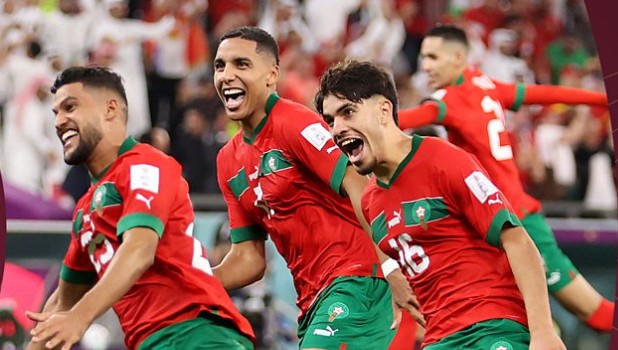Opinion: Morocco’s historic run in the 2022 FIFA World Cup
Credit: Courtesy of Creative Commons user Bradford Timeline
WSPN’s Jeffery Zhang discusses the importance of Morocco’s run in the 2022 Fifa World Cup.
January 31, 2023
The 2022 FIFA World Cup, hosted in Qatar, ended in quite possibly the most thrilling final that the football world has ever seen. Not only that, but the tournament showcased numerous upsets and even featured Lionel Messi’s first ever World Cup win. However, after the exhilarating final between France and Argentina many people seem to have forgotten about the significance of Morocco being the first African country to reach the semifinals. Why is it significant?
First, we need to highlight the population of Morocco and how many professional players the country has produced. Morocco has an estimated population of 37.34 million people, and of that, only a measly number of people manage to rise and perform on the professional stage of football. In fact, of the 2022 World Cup Moroccan squad, only 12 players out of 26 were born in Morocco. This crippling ratio was the lowest in all of the competition according to a tally by FIFA. In addition, Morocco has never produced a football star of the likes of Lionel Messi or Christiano Ronaldo. Even in the past, Moroccan players like Mustapha Hadji, who was named the 50th greatest African player of all time by the African football expert Ed Dove, never compared to players like Zinedine Zidane or Diego Maradona. In this world cup however, Moroccan players like Hakim Ziyech and Achraf Hakimi performed on a world-class level, proving to the world that Morocco deserved to be at that world cup. But even with these two players, how could they manage to defeat powerhouses like Portugal, Spain and Belgium? Through their unbreakable defense.
The Moroccan coach Walid Regragui employed a 4-3-3 formation for his team in order to try and control the middle. By doing this, he could potentially control the pace of the game and prevent getting overrun by faster paced teams like Spain, who are known for their pass and go (Tiki-taka). His strategy would end up failing somewhat, as in almost every game of the knockout stage Morocco had less possession of the ball. But his use of three center-midfielders allowed for more defensive capabilities, only allowing one shot on target from Spain and only three shots on target from Portugal. In my opinion, the formation that Regragui used was perfect for a team like Morocco, focusing more on a defensive formation rather than an offensive formation. If they were to try and use a formation like 4-4-2, with only two center mids and the wingers “stretching” the field, it would be disastrous. Against a team like Spain, who’s known for producing world-class midfielders like Xavi Hernández Creus & Andrés Iniesta, Morocco would lose control of the middle and Spain would have much more freedom in distributing the ball, eventually allowing them to take more shots on target. And as mentioned before, Regragui allowed players who weren’t born in Morocco to play for the team, allowing key player Achraf Hakimi to strengthen the defense.
But ignoring the population of Morocco and the small percentage of professional players that they produce, Morocco’s run is historic because of other African teams and their runs before. In 1990, Cameroon reached the quarterfinals but fell to England. Then in 2002, Senegal also made an impressive run, but lost to Turkey in the quarterfinals. And in 2010, Ghana famously lost to Uruguay in one of the most controversial matches in the World Cup. Luis Suarez, an Uruguay player, famously blocked what would have been a goal with his hand in the last minutes of a game tied at 1-1. If Suarez had not blocked that shot, Ghana would have won and been the first African country to reach the semifinals. After receiving a penalty, Ghana missed the PK and lost in a penalty shootout. These African teams all fell before reaching the semis, inspiring the Moroccan team to push their way into the semifinals.
In a sense, the previous African teams walked so that Morocco could run, except Morocco didn’t just run, they sprinted. They sprinted to prove they were good enough to play on football’s biggest stage. They sprinted to show the world that African teams were by no means inferior or worse than European teams. And as the Moroccan goalkeeper Yassine Bonnou reflected in an interview, they sprinted so that the generation after them would know that “they could create miracles”.





![Last Wednesday, the Wayland School Committee gathered to discuss a number of topics regarding the health curriculum and Innovation Career Pathway course. Another large topic of conversation was the ways to potentially mitigate distracting cell phone usage. "These [phones] are going to distract your learning and social relationships," Superintendent David Fleishman said. "That's concrete right there."](https://waylandstudentpress.com/wp-content/uploads/2025/06/Screenshot-2025-06-04-at-9.49.31 PM-1200x886.png)


























Max • Feb 1, 2023 at 8:07 PM
Very intriguing article Jeffery!